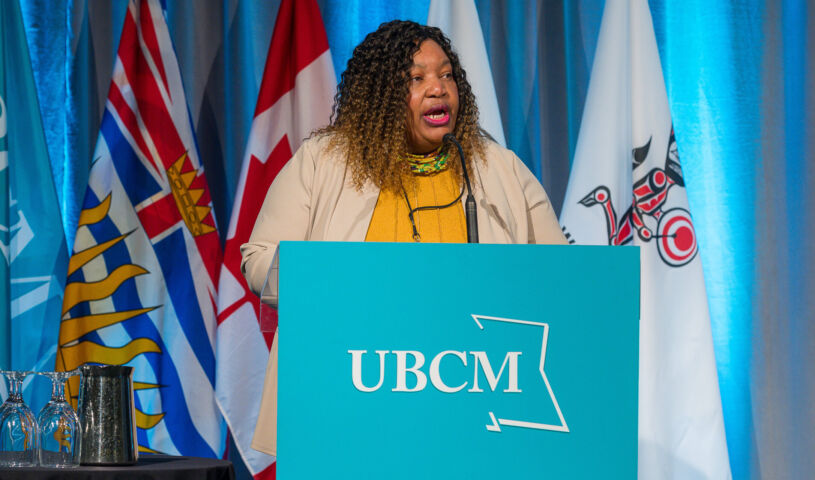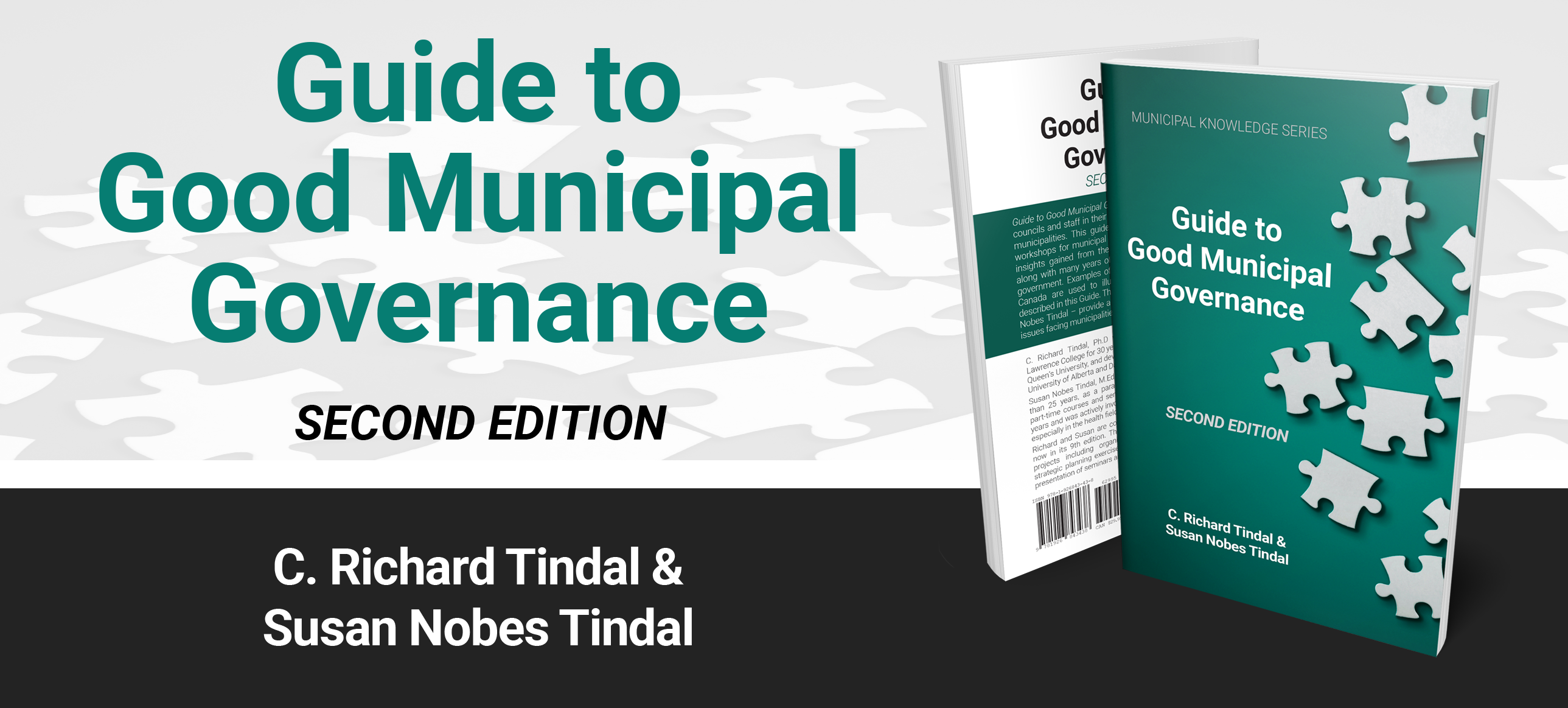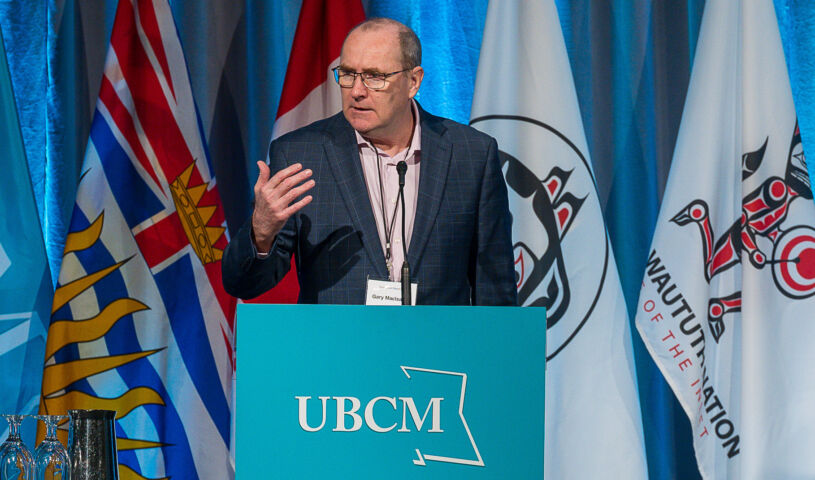UBCM releases annual report ahead of 2024 convention
 The growing gap between municipal budgets and costs is top of mind for many local governments. It will be one of the topics explored by Union of BC Municipalities president Trish Mandewo at the upcoming annual convention. Photo: UBCM Flickr
The growing gap between municipal budgets and costs is top of mind for many local governments. It will be one of the topics explored by Union of BC Municipalities president Trish Mandewo at the upcoming annual convention. Photo: UBCM Flickr
The Union of BC Municipalities (UBCM) has released it’s 2024 annual report highlighting the association’s work over the 2023-2024 fiscal year. The report comes a few weeks ahead of UBCM’s annual convention, which will take place in Vancouver, Sept. 16-20. The annual report will be considered during the convention’s Annual General Meeting, Sept. 18.
In a joint letter to members, UBCM president Trish Mandewo and executive director Gary MacIsaac said the organization’s core priorities have centered on how to secure stable funding for long-term infrastructure, affordable housing, and addressing homelessness. In addition, municipal leaders have been grappling with pressures from the opioid crisis and health care.
“With a mandate to be the voice of local governments in B.C., UBCM’s work is guided by the issues our member communities have identified and is prioritized with strategic direction from the UBCM executive,” the letter said.
Pressure on Municipal Finances
One issue top of mind for many in local government is the growing gap between municipal budgets and costs. Municipalities have long said they simply don’t have enough money to sufficiently meet all their responsibilities.
In response, UBCM has been advocating for changes to the local government finance model. Currently, local governments are primarily limited to using property taxes to fund operations and capital investments needed locally. However, municipal leaders in B.C. and across Canada have long argued that model is no longer sustainable.
UBCM says a shift toward a service economy, e-commerce, and remote work has impacted the property tax base.
“In addition, local governments have been stepping up to take on roles outside their historical mandate, such as housing and the impacts of homelessness and addiction, putting even more pressure on already stretched budgets,” the report reads. “A large infrastructure deficit already exists, and climate change and additional regulations from other levels of government means more money will be needed to provide the infrastructure required.”
UBCM’s call for changing how municipalities are financed echoes proposals from the Federation of Canadian Municipalities (FCM), which released a report highlighting its proposed Municipal Growth Framework.
“By reforming municipal taxation, provinces and territories can provide municipalities with a greater degree of autonomy and long-term financial sustainability, reduce reliance on transfers from federal, provincial and territorial governments, and enable municipalities to better meet residents’ needs,” the FCM report reads.
In January 2022, UBMC and the B.C. government set up a Local Government Financial Review Working Group tasked with exploring solutions to the fiscal pressures municipalities are facing.
Housing and Homelessness
In November 2023, the B.C. government introduced Bill 45, which requires local governments seeking injunctions to remove encampments set up by unhoused people to ensure there is reasonably available shelter that meets minimum standard. However, the bill met sharp criticism from municipal officials who said they don’t have the resources to meet its requirements.
UBCM opposed the legislation and called upon the province to withdraw it. Municipal leaders argued that the bill would effectively bar them from clearing encampments set up by people who are unhoused.
“Our analysis showed that, if brought into force, the legislation would make it practically impossible for local government to attain injunctions for decampments, which would lead to greater numbers of encampments,” a UBCM statement read. “Currently, it is highly unlikely that any community in B.C. has sufficient shelter space for all unhoused persons, so there is reason to believe that it would be practically impossible for local governments seeking an injunction to meet this test.”
UBCM also argued that a “likely” consequence of the bill would be, “Unhoused persons will be able to set up shelter in parks, sports fields, city halls, and sidewalks, knowing that local governments will not be granted an injunction for decampment.”
The provincial government recently announced that it has no plans to bring the legislation into force at this time.
“UBCM is pleased with this decision and continues to call on the province to invest in shelter spaces, supportive housing and complex care facilities, affordable housing, and outreach services to help address homelessness,” the 2024 report reads.
Decriminalization
Another notable issue over the past year for UBCM members has been the decriminalization of illicit drugs in B.C.
The provincial government started the pilot program in January 2023, and it is expected to run until January 2026. It removes criminal penalties for people who possess a small amount of certain illicit substances for personal use. However, some local governments raised concerns about the use of illicit drugs in public parks, beaches, and elsewhere.
At the 2023 convention, UBCM members endorsed a resolution calling on the provincial government to introduce legislation “to further regulate the possession and use of illicit drugs in parks, beaches, sports fields and bus stops where children also gather.”
In response to those concerns, Health Canada amended the exemption. The first change was made in September 2023 to add additional places such as playgrounds, spray pools, wading pools, and skate parks as areas where the possession of illegal drugs was prohibited. A second amendment was made in May to prohibit the use of illegal substances in all public spaces, including hospitals, on transit, in playgrounds, parks, and other areas.
Provincial data from January 2024 shows that since the pilot began drug procession offences in B.C. are down 76 per cent compared with the average for the previous four years. MW
✯ Municipal World Executive and Essentials Plus Members: You might also be interested in Michael Moll’s article: B.C. takes bylaw enforcement for short-term rentals online.
Ibrahim Daair is staff writer at Municipal World.
Related resource materials:
- Surrey, Mississauga latest cities to launch e-bike programs
- UBCM Housing summit: Affordable housing, infrastructure top of mind for delegates
- UBCM 2023: Decriminalization, wildfires highlight conference agenda



